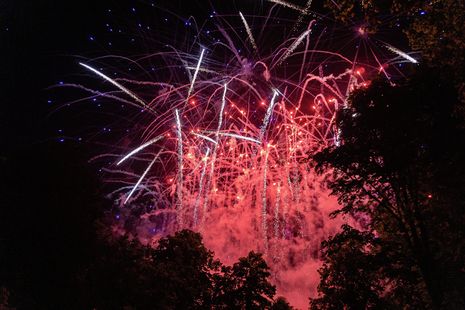Three-quarters of May Ball grub should be vegetarian, insist eco-society
Colleges should also use locally sourced food and entertainment to gain ‘accreditation’

Three-quarters of food served at May Balls should be vegetarian, new guidance from an environmental society has said.
The scheme, organised by the Cambridge University Environmental Consulting Society, gives “accreditation” to May Week events who comply with their guidelines.
Events receive a bronze, silver, gold or platinum award based on the percentage of environmental goals they achieve. Those who succeed in 20-34% will gain a bronze, while events which reach 65-100% will gain a platinum.
|
Bronze |
20-34% |
|
Silver |
35-49% |
|
Gold |
50-64% |
|
Platinum |
65-100% |
Along with ensuring that three-quarters of food is vegetarian – a minimum requirement for committees to receive a bronze – committees should ensure that 30% of food, and 60% of entertainment, is sourced locally.
Guests should also be encouraged to offset their carbon emissions produced by getting to the ball by using a carbon footprint calculator.
Organisers should also be mindful of the investments of sponsors and suppliers given many banks have money in fossil fuels and the arms trade. They should also pursue “generic event branding”, removing specific dates, titles and themes, so objects like glassware and cutlery can be reused.
It is said a majority of organisers are participating in the scheme.
A similar accreditation scheme, organised by the SU’s disabled students’ campaign and May Ball President's Committee, has recommended that guests be given content notes before performances and firework displays in case they are “triggering”.
The guidelines also recommend avoiding “overly stylised fonts”, which can be hard to read. Organisers should instead opt for sans serif fonts which are “helpful” to those with dyslexia.
Event spaces should be at least 80% step free, though this is “a bare minimum”, gender neutral toilets should be available, and mandatory LFTs before attendance are recommended since they would make “vulnerable students feel safer”.
The idea of environmental accreditation originated in 2016 following the appointment of two sustainability officers at that year’s Clare May Ball. But the scheme really took off in 2019 when the number of colleges involved jumped from four in 2018 to 20.
Aoife Blanchard, that year’s organiser, said she was “surprised” that the initiative was only just gaining traction, but was hopeful in that May Ball “presidents do seem quite keen [and] the impetus is there”.
 News / Caius mourns its tree-mendous loss23 December 2025
News / Caius mourns its tree-mendous loss23 December 2025 Comment / Yes, I’m brown – but I have more important things to say22 December 2025
Comment / Yes, I’m brown – but I have more important things to say22 December 2025 Interviews / Politics, your own way: Tilly Middlehurst on speaking out21 December 2025
Interviews / Politics, your own way: Tilly Middlehurst on speaking out21 December 2025 News / King appoints Peterhouse chaplain to Westminster Abbey22 December 2025
News / King appoints Peterhouse chaplain to Westminster Abbey22 December 2025 News / Clare Hall spent over £500k opposing busway 24 December 2025
News / Clare Hall spent over £500k opposing busway 24 December 2025










